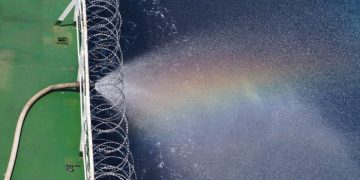Company fined for garbage disposal in Great Barrier Reef
The Australian Maritime Safety Authority has successfully prosecuted the master and owners of the Hong Kong registered bulk carrier ANL Kardinia for illegally dumping garbage in the Great Barrier Reef Marine Park. One Armania Shipping Ltd and the master of ANL Kardinia were found guilty on July 20 in the Townsville Magistrates Court on one charge each of illegally disposing of garbage under the Protection of the Sea (Prevention of Pollution from Ships) Act 1983. The illegal discharge took place on 13 February 2015 and was detected by an AMSA Inspector during a routine Port State Control inspection in Brisbane on 16 February 2015. The AMSA Inspector examined ANL Kardinia’s Garbage Record Book and discovered an entry for a discharge of food waste within the prohibited discharge area of the Great Barrier Reef. One Armania Shipping Ltd was fined $4,000 and the master was fined $300 for the illegal discharge. AMSA Chief Executive Officer Mick Kinley said masters and owners of vessels should be warned that the illegal discharge of ships’ waste would not be tolerated in Australian waters. “Australia has a robust Port State Control regime, designed to ensure ship owners and their masters are following the rules ...
Read more
























































